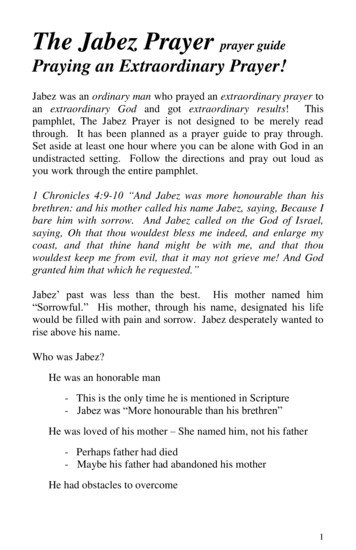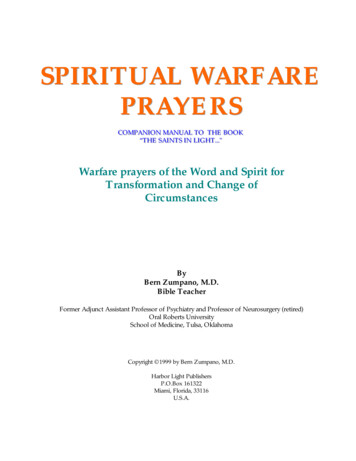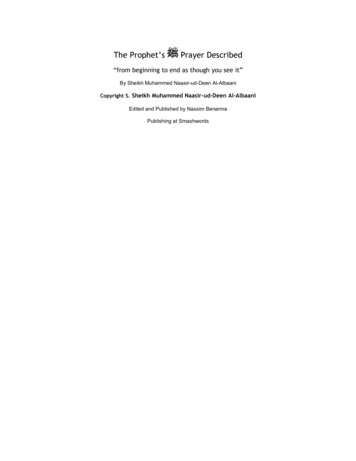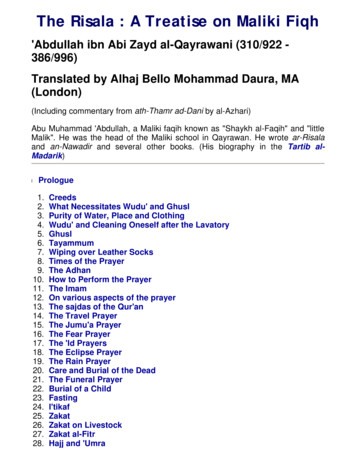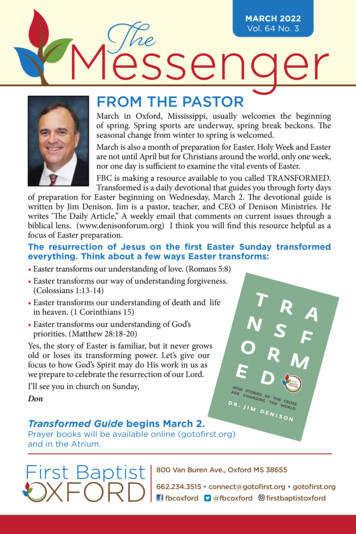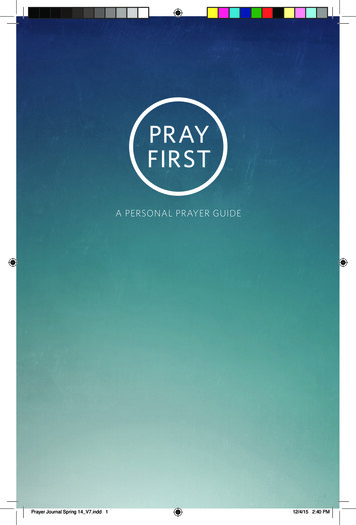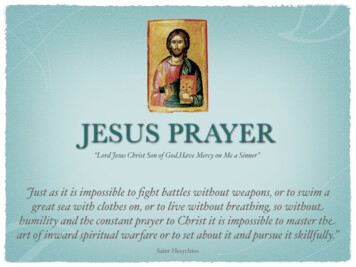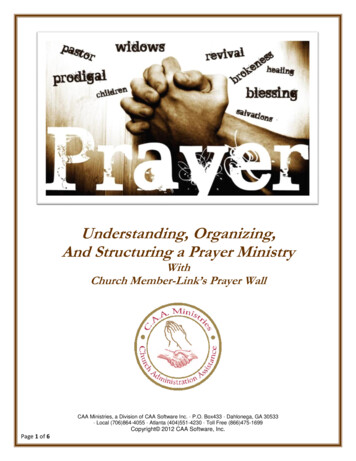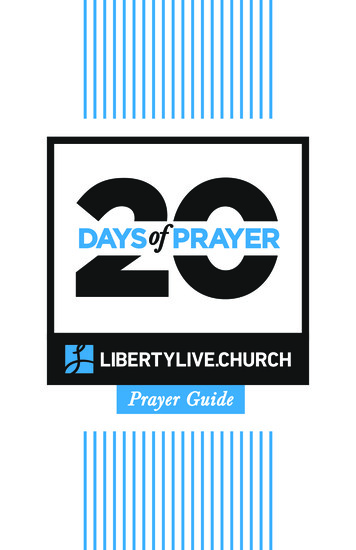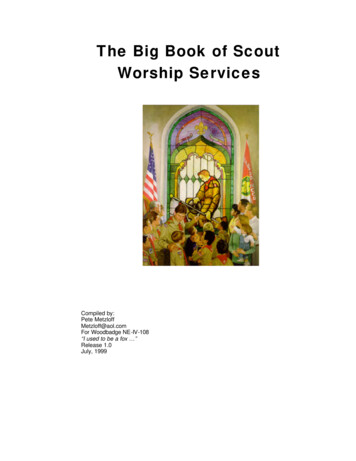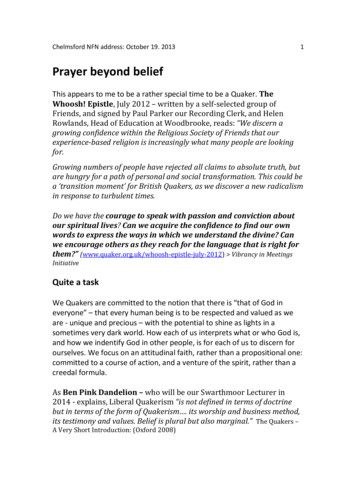
Transcription
Chelmsford NFN address: October 19. 20131Prayer beyond beliefThis appears to me to be a rather special time to be a Quaker. TheWhoosh! Epistle, July 2012 – written by a self-selected group ofFriends, and signed by Paul Parker our Recording Clerk, and HelenRowlands, Head of Education at Woodbrooke, reads: “We discern agrowing confidence within the Religious Society of Friends that ourexperience-based religion is increasingly what many people are lookingfor.Growing numbers of people have rejected all claims to absolute truth, butare hungry for a path of personal and social transformation. This could bea ‘transition moment’ for British Quakers, as we discover a new radicalismin response to turbulent times.Do we have the courage to speak with passion and conviction aboutour spiritual lives? Can we acquire the confidence to find our ownwords to express the ways in which we understand the divine? Canwe encourage others as they reach for the language that is right forthem?” (www.quaker.org.uk/whoosh-epistle-july-2012) Vibrancy in MeetingsInitiativeQuite a taskWe Quakers are committed to the notion that there is “that of God ineveryone” – that every human being is to be respected and valued as weare - unique and precious – with the potential to shine as lights in asometimes very dark world. How each of us interprets what or who God is,and how we indentify God in other people, is for each of us to discern forourselves. We focus on an attitudinal faith, rather than a propositional one:committed to a course of action, and a venture of the spirit, rather than acreedal formula.As Ben Pink Dandelion – who will be our Swarthmoor Lecturer in2014 - explains, Liberal Quakerism “is not defined in terms of doctrinebut in terms of the form of Quakerism . its worship and business method,its testimony and values. Belief is plural but also marginal.” The Quakers –A Very Short Introduction: (Oxford 2008)
Chelmsford NFN address: October 19. 20132This is not new. John Macmurray said nearly 50 years ago in hisSwarthmore Lecture in 1965 “The central conviction which distinguishesthe Society of Friends is that Christianity cannot be defined in terms ofdoctrinal beliefs; that what makes us Christians is an attitude of mind anda way of life; and these are compatible with wide variations, and withchanges of beliefs and opinions ”“Faith no longer means the acceptance of an established creed or theassent to an authoritative system of doctrine. It recovers the originalmeaning of trust and fearless confidence; and this spirit of faith isexpressed in a way of living which cares for one another and for the needsSearch for Reality in Religionof all.”(Swarthmore Lecture 1965).Lloyd Geering – a New Zealand Presbyterian theologian has written:“Religious claims and theological statements, however valuable andinspiring, can never be more than human attempts to say something ofultimate importance. Therefore they should never be identified with theultimate truth, but must always remain open to question and review.Theology (or God-talk) is highly symbolic. It bears greater resemblance topoetry than to definitive or descriptive statements. .“Christianity is today in a more fluid state than it has been since the time ofChristian origins. Nothing from its past is any more to be regarded as finaland absolute. Everything is open to review and to change. We are free toexplore whether or not the traditional idea of God is any longer essential toChristianity. “Lloyd Geering – “Christianity without God” paperback 2003 edition. pages 15-16.This is the base from which I speak today. It is further illumined by thewritings of Gretta Vosper, a Minister of the United Church of Canada,founder & Chair of the Canadian Centre for Progressive Christianity.Gretta Vosper has written what the American Bishop Jack Spong describesas a “powerful book, a provocative book, a book that needs to be read anddebated”.
Chelmsford NFN address: October 19. 20133He himself is a noted and controversial writer and theologian. He statesthat Gretta has pushed the insights of several modern Christian writers“into dimensions of truth and experience beyond anything I had yetembraced. She made me realise just how much real work still needed to bedone to bring about a reformation in Christianity that would ensure itsvibrancy well into the 21st century. I was absolutely stunned by her brillianceand by the comprehensiveness of her far-reaching intellect.”The noted English philosopher and writer on religion and science - AlfredNorth Whitehead wrote in “Science and the Modern World” in 1925Religion will not regain its old power until it can face change in the samespirit as does science.Its principles may be eternal, but the expression ofthose principles requires continual development.His words express very well the principal themes of Gretta Vosper’swritings. The essential message underlying all her work is that our wholeway of thinking in the Christian tradition needs to be drastically overhauled,changed, and reformulated.Why? Because in every other field of knowledge and experience – newknowledge and new experiences which add to or challenge our previousknowledge and experience, requires us to revise our mind-set, - ourparadigm - as well as our practice.It does so in science, technology, commerce, communications, sociology,and many other fields. The whole picture – or paradigm – changes in eachof these fields of knowledge with new material. Very little of the science of1813 is still relevant to us this year. Doctors were then still bleeding peopleas treatment for infection. In the last two centuries there has been whatWhitehead describes as “unprecedented intellectual progress”.Christianity, on the other hand, is stuck with a paradigm that made sensewith the knowledge available 1500 or 2000 years ago. Christian leadershave tended to be defensive against each development of knowledge orpractice, until obliged to accept it. This you can see in the tortuous processby which they came to accept Darwin’s theory of evolution; and in our ownday are coming to rethink their views of homosexuality.
4Chelmsford NFN address: October 19. 2013Christianity still defines itself with creeds formulated in the fourth century.Like many other Christians today, I cannot any longer say them withintegrity.Five key elementsThe five key elements that I will briefly review in this new paradigm are:The BibleGod Jesus DoctrinePrayerThe BibleTraditionally – the Bible has been regarded as the revealed Word of God,authoritative for all time.New knowledge and research, not only from Christian scholars with theiranalysis of the earliest versions of the scriptures, but from Jewish ones too,have challenged many long-held ideas. Geza Vermes, the former Catholicpriest who reverted to his Jewish roots, became the first Professor ofJewish Studies at Oxford University, the author of the standard translationinto English of the Dead Sea Scrolls, and one of the most important voicesin contemporary Jesus research, gives us a markedly different view of whoJesus was, what he did and what he taught. He looks at Jesus from aJewish perspective, not through the prism of Catholic doctrine.Furthermore, the fruits of archaeology only possible since Israel occupiedthe West Bank area in 1967 give us new perspectives on the Old Testament.Other disciplines such as Roman history, anthropology, social history,linguistics, cultural studies, and the finds of ancient manuscripts in cavesbeside the Dead Sea, and at Nag Hammadi in Egypt, in the 1940s havetransformed our understanding of the books of the Bible, their origin,authorship and meaning.We now have a good deal more clarity and understanding of the process bywhich Jesus – the remarkable Jewish mystical exorcist, healer and teacher,whose message was for Jews only, became transformed over 300 years intothe exalted figure of Christ, the second member of the Holy Trinity.I do not think we can, with integrity, regard the Bible in the same way as ithas been regarded by Christians in the past, and continues to be regardedby very conservative believers.
Chelmsford NFN address: October 19. 20135There is much in the Bible that is inspiring, motivating, compelling,visionary. There is much too that is myth, that is sadistic, and has accountsof events written to meet a given agenda – today we recognise the work ofspin doctors – and they were at work throughout the drafting and editing ofthe books of both the Old Testament and the New Testament. We can treatit as a source book for inspiration and draw from it new light – as poetry,story, prayer, moral guidance – but I cannot with any intellectual integrity,treat it as the authoritative word of God. It is inspired, and the fruit ofspiritual experiences, but it is not infallible.God – I am glad that Quakers do not find ourselves committed to subscribeto any particular understanding of God, for that has undergone vastchanges over the time that people have put their trust in God. Writings likethose of Robert Bellah “Religion in Human Evolution”, and KarenArmstrong’s books such as “A History of God”, “The Battle for God” and“The Great Transformation” explore these developments.There is no agreement in history about who God is, and what is God’snature. There are widely different perspectives among Jews, Christians,Moslems, among the Hindus of India, the Buddhists of Tibet, the Shinto ofJapan, the Druids or Wicca of Britain, and the American First Nations. Theancient Egyptians, Greeks and Romans, and the Incas of South America hadmany gods – and I do not know of anyone nowadays who trusts or worshipsthem.Among Christians there are wide variations in people’s concept of who orwhat God is. Christians are unusual in their focus on philosophicalspeculation about the nature of God – in which doctrinal belief is moreimportant than loving and compassionate behaviour. Jews and Muslims forexample are obedient to the discipline, the practices of their religion. It wasonly when the young Christian church separated from its Jewish roots thatit began to develop such speculation that led to the concept of the Trinity,in the 4th century. The concept is mind-bogglingly complicated in thelanguage for example in the creed of St. Athanasius. It is a long way fromthe simple concept of a loving Father which many people have.In the lifetime of the Religious Society of Friends – just over 360 years –scholars of different Christian traditions have tried to reshape their
Chelmsford NFN address: October 19. 20136understanding of God in the light of modern knowledge. We have hadTheism, Deism, Pantheism, and Panentheism.There is a tradition in Christian theology, called, the Apophatic Tradition,which goes back to the end of the second century with Clement ofAlexandria. This says that as anything we try to say about God is so veryinadequate – contemplation of the divine is beyond language - we can onlysay what God is not: not male or female, in human form, beyond theclouds, or many other things God is not. What it doesn’t say is – how canwe know God is? All religious ideas were created by humans to explainsomething of the mysterious parts of our life and experiences. These ideashave changed a great deal over the last three thousand years. There is noway of proving any of them - they are a mixture of hopes, fears, desires,and invention.God is a powerful force in the lives of many millions of people. This is aconcept built on experience and interpretation, assumption, hope, belief –but all are intangible and speculative. I was taught it, and based my life onit. I prayed and sought a relationship with God – but gradually God nolonger seemed credible.I found it took me a while to adjust mentally and emotionally to life withoutGod. At first I felt a bit lost - even bereaved, but I didn't want to pretend toa belief or trust I no longer had. Now I am very clear, confident and relaxedin accepting that while there are many wonderful and mysterious aspectsof life, I don't need an idea of God to understand life. For me, life just is. Idon't expect anything beyond the death of my body. I am content. Just asmany years ago I grew to be independent of my natural parents, I grew tobe independent of a divine parent. After a difficult part of my spiritualjourney, I now find my experience of prayer has been enriched: I havebeen liberatedHowever – I am not seeking to persuade others to share my point of view.Each person has their own spiritual journey, their own experience andideas. Each of us has been heavily influenced by our parents, and theenvironment in which we grew up. It is important that we each find a wayto speak honestly of our experience, to describe how we understand our
Chelmsford NFN address: October 19. 20137experience, and to develop our lives accordingly.Gretta Vosper writes: I know no proof of God beyond personal experience,and I cannot acknowledge that proof as substantial I prefer toacknowledge my ignorance in regard to matters of which I can have noreproducible evidence I know there exists a world beyond me – the“other” – but whether that other includes another kind of being, I simplydon’t know .What I need to understand is how I may continue to developmyself spiritually, open myself to learning, and stay committed to livingwith integrity.”I’m suggesting that we write our own sacred wisdom again, this timegleaning from scripture all that is life-enhancing – but none that is not.In other words – construct a new paradigm.She goes on to say is that “there are values I believe we must choose andon to which we must fervently hold. I propose that these values could bethe foundation for the future assessment of our beliefs and practices,affirming those things that ennoble the human spirit and sifting out thosethings that diminish it.It seems she is affirming our Quaker approach in emphasising ourtestimonies, and leaving speculative theological questions on one sideas no longer relevant or important.JesusMany people today honour Jesus of Nazareth, not as the divine saviourwhose death on the cross opened for us the gate of heaven, but as aJewish mystic healer, exorcist and teacher, with some charismatic gifts,and what Vosper describes as “a great posthumous marketing team.”DoctrinePope Francis seems to think that the world-wide Catholic church hasbecome rather too pre-occupied with the minutiae of doctrine and
8Chelmsford NFN address: October 19. 2013sexual behaviour in a legalistic way, and lost sight of the importance oflove, of an open welcome to people who are poor, oppressed, andseeking hope.Quakers on the whole don’t give much attention to Christian doctrine –instead our attention is focused on our testimonies. Are others cominground to the need to do the same? All religions have personal andcorporate transformation at the heart of their teaching. That is where thenew paradigm needs to focus. – See The Charter for CompassionPrayerMy theme today is not to explore any of those topics - The Bible, God,Jesus, or doctrine - in detail. Those are the foundations from which newapproaches to the Christian way are springing, but we are not tied to theold formulations. Now is a time for a new paradigm.So when belief has changed, what can prayer mean now?Prayer beyond beliefACTS – adoration, confession, thanksgiving, supplicationPraising – worship, adoration, expressions of love and loyaltyThanking – thankfulness – for blessings in various formsAsking – making requests – to provide, to protect, to guide,Confessing – apologising, groveling, remorse, desire to changeThese become transformed intoAWECONCERNSRELFECTIONTHANKFULNESSOther elements includeWorking outGuidance seeking – discernment in difficult decisionsRailing – expressing anger, grief, blame, criticism, painReflecting & lovingMeditation – reflection on themesSELF-
Chelmsford NFN address: October 19. 20139Contemplation – the prayer of silent waiting, wondering,open to the Spiritalone – or with othersAWEAnne Lamott – American novelist & political writer –author of The Three Essential Prayers – Help, Thanks, Wow“You can either practice being right, or practice being kind”Awe – awe, awareness, wonder, awakening.At the sky – a landscape – a newborn baby.At the intricacy of a flower, or the human eye,Beautiful craftsmanship Selfless service –Looking at the world in depth – noticing details – for example on a walkI find myself amazed and sometimes intrigued by the wonder of all that is the structure of a flower - how an eye works,the astonishing size of the universe, or the beauty of a natural landscape.the creative skill and inventiveness of a great musician or artist, anengineer, a nurse, a gifted teacher or designer, the confidence with figuresof an accountant, or the gift someone has in training an animal – personalservice and self-sacrifice to benefit others.I cherish Advices and Queries number 7 even though the words “spirit ofGod” mean something different to me than to some other people.“Be aware of the spirit of God at work in the ordinary activities andexperiences of your daily life. Spiritual learning continues throughout life,and often in unexpected ways. There is inspiration to be found all around us,in the natural world, in the sciences and arts, in our work and friendships, inour sorrows as well as our joys ”Take time to practice AWE - the pocket reminder
Chelmsford NFN address: October 19. 201310THANKFULNESSThankfulness, There are so many things in life that I am blessed in –my wife, children and their spouses,grandchildren,other family and relationships, friends and Friends,home, warmth, food, clothing, a standard of living and comfort which Iknow is not shared by the vast majority of the people of the world. All this Ican too easily take for granted. When I reflect with thankfulness I begin toappreciate many of these things in new ways.Expressing gratitude to another is courteous.I find simply recognising with thankfulness so many aspect of life, the joysand benefits of being alive, simple pleasures, ways of being enriched intastes, smells, opportunities, knowledge, entertainment, books, my reclinerchair, my computer and mobile phone, my spectacles without which my lifewould be very trying, a daily shower, clean clothes, fresh air, a welcominggreeting, a smile, a hug. There are so many rich experiences of life forwhich I am thankful. All these seem to me a natural part of a life of prayer,though I do not address my awe, gratitude or concerns to any divine being.Make time to appreciate all that we too easily take for granted.A discipline of spiritual practice – it can be done in many different places,at many different times – whatever the opportunity of time is thereA different pocket reminder
Chelmsford NFN address: October 19. 201311CONCERNConcern – concern, compassion, caring, – For Quakers, having a concern,has a particular meaning. It refers to a matter which one of us thinksimportant enough to want to bring for consideration to fellow Quakers in aLocal Meeting.If others agree this matter can be referred to the area meeting and beyondto national Quaker meetings for consideration.In this context, I use the word concern to refer to matters which I amconcerned about enough to want to reflect on them, and perhaps talk oract with others to contribute to some positive action. This may be incontributing money to a cause which addresses this concern, orsign petitions or write to a newspaper or a member of parliament,or to draw me to find out more about a particular situation.It may lead me to take specific action to help an individual or group.Many people pray to God for such concerns. I no longer feel drawn to askGod to take the action I think is necessary. I find prayers to God are oftentelling God things such a God would already know, and if God is theUltimate Compassionate One, will already be taking action on.I like the story of the soldier who entering a bombed church, found a statueof Jesus whose hands had been blown off. He hung a notice round the neckof the statue which stated: “No hands but ours”. If the world is to be madea better place, Jesus certainly provides a classic example ofencouragement, motivation, and idealism to us – but it is up to us to dosomething about it.Advices & Queries 20 – Do you give sufficient time to sharing with others inthe meeting, both newcomers and long-time members, your understandingof worship, of service, and of commitment to the Society’s witness? Do yougive a right proportion of your money to support Quaker work?WORSHIP – Worth – ship – worth, dignity, deserving esteem, honour orrepute. I have no difficulty with continuing to use the words:Meeting for Worship.
Chelmsford NFN address: October 19. 201312SELF-REFLECTIONSelf-reflection – The Greek philosopher Socrates is credited with saying:“The unexamined life is not worth living.”I was trained in the high church Anglican tradition – confessionfor the most part I hated it, and came to avoid it. Only very occasionally didI find it healing and helpful – for the rest it was largely an artificial processof thinking up things to confess.I came also to dislike the fact that most church services start with everyonesaying together a “confession”. These are ritualised words which I foundmyself saying without any real sincerity.I find I need to take time to reflect on my relationships with other people.I need to consider what I have said to a particular individual, or how I havetreated another, the things I have done which I have felt have beenpositive, and those which I regret and think were mistakes, errors, or a lossof self-control.I need to reflect whether my words, thoughts or actions were appropriate –were well considered, and whether there are things I can learn fromreflecting upon them. How would I consider doing things differentlyanother time? Some of the things I reflect on concern only myself – mychoice of what I spend my money on, what I eat or drink, what exercise orreading I do, whether I am side-tracked from what I should treat as apriority when I am attracted to get involved with something that seems atthe time much more interesting.I find the words in Advices and Queries number 11 helpful: “Be honest withyourself. What unpalatable truths might you be evading? When yourecognise your shortcomings, do not let that discourage you. In worshiptogether we can find the assurance of God’s love and the strength to go onwith renewed courage.”For me - “the assurance of God’s love” is a re-affirmation of myself as aperson. I do not look for any other assurance, though I would were I to feelI was not acceptable within my family, my circle of friends, or within theReligious Society of Friends.
Chelmsford NFN address: October 19. 201313GUIDANCE SEEKINGI have deeply valued Meetings for Discernment – Meetings for Clearness.That too is an important part of our spiritual life as Quakers.The collective reflection of Friends whose wisdom and experience youvalue, shared in an open way, to lead to new light, and well-thoughtthrough decisions.Advices & Queries 15 Do you take part as often as you can in meetings forchurch affairs? Are you familiar enough with our church government tocontribute to its disciplined processes?Do you consider difficult questions with an informed mind as well as agenerous and loving spirit? Are you prepared to let your insights andpersonal wishes take their place alongside those of others or be set aside asthe meeting seeks the right way forward?RAILINGRead the Psalms and you will see how good it is to get off your chestAngerGriefBlameCriticismPain
Chelmsford NFN address: October 19. 201314MEDITATIONThe prayer of silent, open waiting, in deep stillnessI commend to you: God Just Is – by Curt GardnerMeditation – is a positive activity, with physical, emotional, spiritual, andintellectual benefits for the meditator.The practice of mindful awareness is beginning to be more and more taughtto people with stress and with mental health problems – to enable them todeal more resourcefully with their difficulties.The practice of meditation – internal focus of attention in mindfulness –activates and changes the way our brains function.There is a “left-shift” to the frontal cavity of the brain – this enhances ourresilience, and boosts our immune system. Our body’s ability to fightinfection is improved.The person who meditates feels clearer in their mind, and moreemotionally stable.It is now being used more and more with people who have obsessivecompulsive disorder, borderline personality disorder, and drug addiction,and in preventing depression.It is thought likely it will help people to stop ruminative thoughts, repetitivedestructive emotions, and impulsive and addictive behaviours.Experiments with medical students suggest it improved their empathy, andhas the potential to reduce stress burnout, and improved sensitivity andgood “bedside manner” towards their patients.
Chelmsford NFN address: October 19. 201315The spiritual exercises of Ignatius of Loyola, founder of the Roman Catholicreligious order the Society of Jesus, provide me with a helpful structure fora late evening prayer exercise, that I have chosen to adapt to my ownviewpoint.1. To settle into a stillness and silence2. Review the events of the day with gratitude3. Pay attention to my emotions – and to particular events thatengaged my emotions4. Choose one event or feature of the day to reflect on furtherAnticipate tomorrow with hope
16Chelmsford NFN address: October 19. 2013Handout OneGodless prayer – impossible?Do you respect that of God in everyone though it may be expressed inunfamiliar ways or be difficult to discern? Each of us has a particularexperience of God and each must find the way to be true to it. When wordsare strange or disturbing to you, try to sense where they come from andwhat has nourished the lives of others. Listen patiently and seek the truthwhich other people’s opinions may contain for you. Avoid hurtful criticismand provocative language. Do not allow the strength of your convictions tobetray you into making statements or allegations that are unfair or untrue.Think it possible that you may be mistaken.Advices & Queries 17.Listen – be open to the Spirit – seek to know an inward stillnessreflecting and loving in meditation or contemplationACTS of prayerACTSAwe - AwarenessConcernsThankfulnessSelf- examination – being honest with ourselves A&Q 11Seeking Guidance & Self - expressionWhether we address our prayer to God, or we do these spiritualexercises without a concept of God – it is important that asFriends we respect each other’s experiences, cherish each other,and live together in peace and harmony.“Remember that Christianity is not a notion but a way.” A&Q 2
17Chelmsford NFN address: October 19. 2013Handout TwoMeeting for Worship implausible for a nontheist?“Worship is our response to an awareness of God.”Worship means – worth-ship – worth, dignity, deserving esteem, honour or repute.Without an awareness of God – can we share similar experiences– but account for them differently?Listening to the Spirit?Heeding the promptings of love and truth in your hearts?Being led to a discernment?Are these natural or super-natural phenomena?Whether we seek to listen, to or be led by, God, or we share thesame experiences but do not attribute them God – it is importantthat as Friends we respect each other’s experiences, cherish eachother, and live together in peace and harmony.“Remember that Christianity is not a notion but a way.” A&Q 2
18Chelmsford NFN address: October 19. 2013Handout ThreeReading listBooks referred to during the dayThe Whoosh! he Quakers - a Very Short Introduction, by Ben Pink Dandelion . Oxford 2008Search for Reality in Religion – by John Macmurray – Swarthmore Lecture 1965Christianity without God – Lloyd Geering, 2003. Polebridge Press, California.With or Without God – Gretta Vosper. 2008. HarperAmen – what prayer can mean in a world beyond belief – Gretta Vosper. Harper. 2012Science and the Modern World – Alfred North Whitehead. 1925Religion in Human Evolution – Robert Bellah. 2011 Harvard University PressA History of God – Karen Armstrong. 1993 Random HouseThe Battle for God – Karen Armstrong. 2000. HarperThe Great Transformation - Karen Armstrong. 2006. Atlantic BooksThe Case for God – Karen Armstrong. 2009. Bodley HeadTwelve Steps to a Compassionate Life – Karen Armstrong. 2011. Bodley HeadGod Just Is – by Curt Gardner. Quaker Books. 2012Jesus the Jew – Geza Vermes. 1973. S.C.M. PressThe Authentic Gospel of Jesus – Geza Vermes. 2003. Penguin Books
19Chelmsford NFN address: October 19. 2013A simple framework for a spiritual disciplineHandout FourPrayer beyond beliefACTS – adoration, confession, thanksgiving, supplicationPraising – worship, adoration, expressions of love and loyaltyThanking – thankfulness – for blessings in various formsAsking – making requests – to provide, to protect, to guide,Confessing – apologising, groveling, remorse, desire to changeThese become transformed intoAWECONCERNSTHANKFULNESS SELF-RELFECTIONOther elements includeWorking outGuidance seeking – discernment in difficult decisionsRailing – expressing anger, grief, blame, criticism, painReflecting & lovingMeditation – reflection on themesContemplation – the prayer of silent waiting, wondering,open to the Spiritalone – or with othersThe spiritual exercises of Ignatius of Loyola, founder of the Roman Catholic religiousorder the Society of Jesus, provide me with a helpful structure for a late evening prayerexercise, that I have chosen to adapt to my own viewpoint.1. To settle into a stillness and silence2. Review the events of the day with gratitude3. Pay attention to my emotions – and to particular events that engaged myemotions4. Choose one event or feature of the day to reflect on furtherAnticipate tomorrow with hope
Chelmsford NFN address: October 19. 201320
those principles requires continual development. His words express very well the principal themes of Gretta Vosper's writings. The essential message underlying all her work is that our whole way of thinking in the Christian tradition needs to be drastically overhauled, changed, and reformulated. Why?
